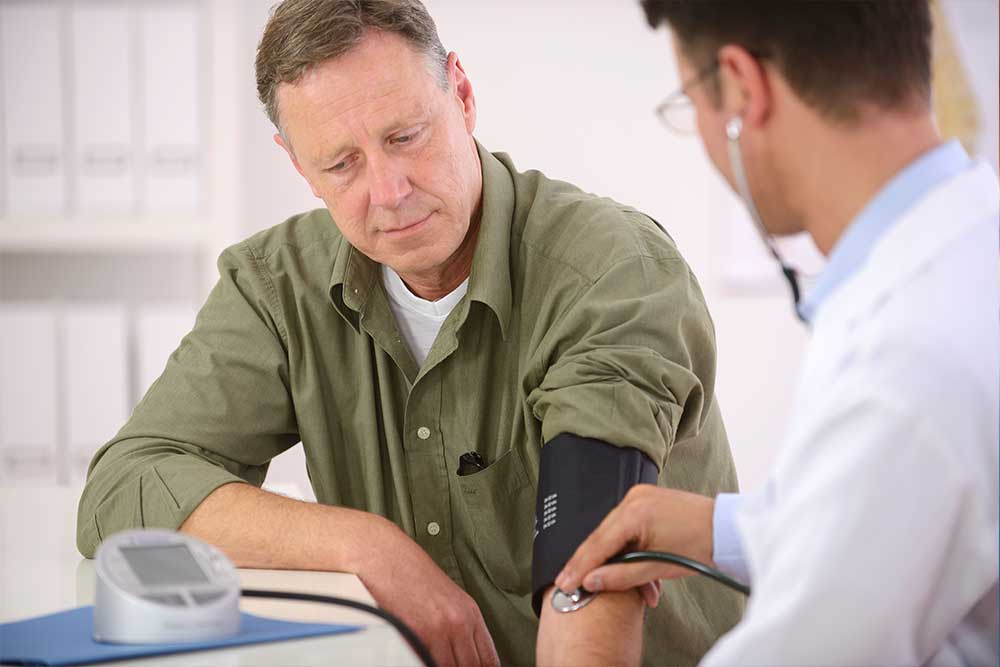Dr Ross Walker:
Cardiovascular disease is no doubt the biggest killer around the world. In Australia alone, one person dies every 20 minutes from this disease. We now have excellent treatments if someone makes it to hospital, but often the follow-up is a little bit LAX and it’s my opinion that all patients with acute cardiac disease should be followed up with some form of cardiac rehab.
Tonight, we have in the studio doctor Christian Verdicchio, I’ll ask him how he pronounces that properly, he’s the Heart Wellness and Cardiac-Rehab manager in Macquarie Health Corporation.
Good evening, Dr Christian. Can you explain to the listeners what is actually cardiac-rehab and what’s the difference between that and heart Wellness?
Dr Christian Verdicchio:
Cardiac rehabilitation is really defined as a process where someone would present with heart disease and then they go through this multidisciplinary approach to try and get them back on their heart health. They’ve had their surgery, they’ve had their acute event where they’re medically stable and they go through this complex intervention where they get exercise therapy which is very important. They get attended to their cardiovascular disease risk factors. So, things like weight-loss and alcohol-cessation in conjunction with smoking-cessation as well, and also, they’re going to be attended in terms of the educational purposes which is actually a key component. Ultimately, you’re trying to empower the patient to understand, to make the best long term life choices to get on top of their heart health. Cardiac-rehab or cardiac-rehabilitation is a well defined term in the world, personally speaking, I don’t like the terminology with all my research background and academic background in exercise cardiology. The program that I manage at the moment across multiple rehab sites is the Heart Wellness program, which is our type of cardiac-rehabilitation. But the connotation with cardiac-rehab is typically foreseen for older patients and it’s something that’s seen for people who have very low levels of functional capacity following their heart diagnoses or their heart intervention. Whereas we’re trying to say, well hang on a second, you know you’ve got diagnosed heart disease, whether you’re in your 40s, 50s, or 60s we can tailor an exercise and lifestyle intervention program for you. Because at the end of the day if you are fairly active you still had an event, so something needs to change and we want to really try and drive some significant improvements.I think Heart Wellness captures the entire area of what we’re trying to do.
Dr Ross Walker:
You see, this is the problem that I see. People get into hospitals, and these days the big push is to get them out quickly. They’ve had this stent, they’d be lucky to have two or three days in hospital after a stent-bypass surgery, they’d be lucky to have a week in the hospital after that. But in that time, they are often too shocked, too sick to really take in any good information. And that’s why I’m a really strong supporter of a viable, well proven cardiac-rehabilitation, or even better as you say, a Heart Wellness program.
Can you explain though, is there any evidence to show that there are hard events that are going to prove that rehabilitation actually works, or is it just sort of a nice thing to do?
Dr Christian Verdicchio:
Well, we can talk about it from two perspectives. I mean, we know with having healthy levels of weights, having higher levels of cardiorespiratory fitness or physical activity levels, you’re less likely to develop heart disease. On the flip side, if you have heart disease, you have had an event, you’d have surgery. If you are able to again attend to your lifestyle, risk factors such as your weight and those type of things, especially getting on top of your cardiorespiratory fitness through a tailored exercise program and doing it quite regularly, independently, exercise alone can reduce your long-term outcomes of having another cardiac event can increase your survival rate significantly. In fact, we now know that by improving your cardiorespiratory fitness level, even though if you have heart disease, we can actually have the same outcomes as compared to someone who doesn’t have heart disease. It’s quite achievable.
The guidelines of the moment state around 150 minutes per week of physical activity or exercise. That’s probably going to shift in near future, but all the research and the data brought are shifting towards more than 210 minutes, which equates to about 30 minutes a day of aerobic-physical-activity or exercise. That’s where we really push it with our program, in terms of the Heart Wellness program. What we’re trying to do is trying to show that we have a program that’s also preventive. People can come in from a prevention side to try and stay away from hospitals. We have a program that is also able to really push patients, whether it’s using more than one form, or what we call interval training which is very beneficial for cardiac patients. And at the same time, we are also quite unique being a private rehab provider. We are actually able to follow up with patients when they leave us.
Dr Ross Walker:
Yes, but you’re still talking too much about exercise, it’s not just about exercise. The Heart Wellness program has much more than that. You alluded to that before, but one of the big things, and I’ve got to say that I’ve been a cardiologist for well over 35 years and practicing medicine for over 40 years. I’ve never seen one person in that time who has had a heart-attack, stent-bypass, or stroke who wasn’t under some sort of stress at the time. Some of it could be physical stress, I accept that, but it’s all also the other stresses. What do you do in your Heart Wellness program to help people learn to cope with stress better?
Dr Christian Verdicchio
Great question. When patients come in to see us, and typically this is the same even for tertiary hospitals as well in the public sector, you get seen by a cardiac nurse, they’ll go through your lifestyle risk factors, they’ll provide you with the education around what you’ve had and really trying to provide you with that information for the long-term outcomes to understand that you have to change your lifestyle. You’ll see our exercise physiologist; they’ll go through co-respiratory fitness testing and your regime along with the physio. We have an OT and we have a dietitian because I understand weight loss is key.
Dr Ross Walker:
And just general nutrition is key as well.
Dr Christian Verdicchio:
Yeah, 100%. We have a psychologist involved in the team. The psychologist is really important because some of the questionnaires that we screen for patients in cardiac rehab are around depression and the question that we use is to look at anxiety and depression. You may get patients who from a depression side are quite OK, but they’re quite anxious. I’ve just had an event and they’ve had a heart related event as you would understand. So, the psychologist is also able to attend to their individual needs to help them facing their psycho-social issues at the following present moment as well. We really offer a multidisciplinary approach to cardiac-rehabilitation in our Heart Wellness program. To be honest, we’re actually the largest private rehab provider for cardiac rehab in the country, and also at the same time, we’re very unique because we can actually give patients the opportunity to require intensive inpatient-rehabilitation following their heart event. We do have that available. We’re typically a private rehab hospital, so that’s kind of the primary basis of our model.
We do the outpatient which is predominantly where most of the cardiac patients are going to come from. Let’s be honest, they go into hospital, they have their procedure and they’re discharged so they’re going to most likely come as outpatient. We have what they call the phase three in cardiac-rehab and this is not offered because in the public sector they just don’t have the funding or the resources available. And what we know, especially from my research back in Adelaide, is that really trying to achieve good long-term outcomes with patients need a lifestyle change and they do need follow-ups during the remainder of that period.
Dr Ross Walker:
So, what sort of hard evidence do you have that this stuff works?
Dr Christian Verdicchio:
Actually there was a really interesting story that came out just recently from the American Heart Association. They looked at around 3000 patients. It was an observational study, so between 2002 and 2012, and there’s so much evidence on cardiac-rehabilitation, but this one here sums it up nicely. And what they looked at was those who partook in cardiac rehab sessions and they quantified it. They said if you did 20 sessions following your discharge from hospital of cardiac-rehabilitation, 15 sessions, 10 and below 7. What they found was that those who did more than 20 sessions during that structured program and their five-year risk of having a major adverse coronary event, so having another arrhythmia, cardiac heart attack, and any of these types of things was about 40% to 50% lower compared to those who did less than 10 sessions of structured cardiac-rehabilitation.
What’s scary about that, and it’s about 9 sessions to be honest, but what’s scary about that is that the average cardiac rehab sessions in Australia is nine. So, you’re touch and go. If you’re in the program that some hospitals do twice a week across four weeks, you’re on 8 sessions. You’re not probably going to get that long term benefit. If you’re in those hospitals twice a week for six weeks, then you know you’re just going to get into summer getting that long term 5-year benefit.
Our program is 20 sessions and I’m really proud of that. It’s a six weeks program, three times per week, and it’s really there to try and get the best bang for your buck in terms of getting the patient fit and getting the weight under control reducing the cardiovascular disease risk factors and setting them up for when they transition home.
Dr Ross Walker:
Okay. There are a lot of people who will be listening now who’d had a heart attack, a stent, maybe even a stroke, ablation or something like that, but the questions they’d be asking are “How much is this going to cost me?”, and secondly, “How can I get in touch with these people?”
Dr Christian Verdicchio:
In terms of our reach in the Heart Wellness program, we have nine sites across Sydney and nine private rehab hospital sites, we have one in Melbourne as well. You just need to go to your GP with your cardiologist and if you’re under private health insurance through your hospital you are actually covered for this and there are three ways typically you can go about it. If you’ve had an acute event where you are now medically stable or you’ve actually gone into hospital or had a procedure, you’re automatically entitled under your hospital to have this form of rehabilitation covered. The other one is that if you haven’t had any of that, but you have established heart disease, you’ve become a little bit deconditioned as a result of that heart disease and you start to have some symptoms in some way with shortness of breath, palpitations, then that is also another way where you’re actually able to be referred into the program and be covered under your private health and hospitals insurance.
Dr Ross Walker:
But you’re inferring that the public system just can’t cope with this and are not really offering this sort of service, but with the evidence you presented to me, it should be that the government’s looking at this and saying, if we can’t do it in the public system, we should be able to facilitate our public patients to have this available in the private system.
Dr Christian Verdicchio:
I agree. I mean the public system, to be honest, they do a very good job with the resources that they have and everyone that runs these programs always have some form of benefit, so I’m not going to talk down upon the public hospitals and they do a fantastic job. But the reality, especially now during COVID, a lot of these hospitals now have gone to tele-health. Telehealth is great, but to prescribe exercise on weight loss, you do need to see the patient, you do need to provide them with supervision and supervise their first sessions and things like that. Saying that during these time periods some of the hospitals are quite busy, especially the public ones. If you’ve got private health insurance, you might as well take advantage of that, get bang for your buck and actually come across and take advantage of it. It also probably is closer to where you live. Since moving to Sydney, I realize the traffic’s quite intense and the parking is not easy, especially if you go to bigger hospitals in the city. With our nine locations across Sydney area I’m sure will be able to cater something close to your home.
Get In Touch With An Allied Health Specialist
Cardiac Rehabilitation is a Heart Wellness Program that includes exercise and information sessions to help you get back on your feet again after a heart attack, heart surgery or procedure.
Join Our Mailing List
Copyright © 2020 Heart Wellness



